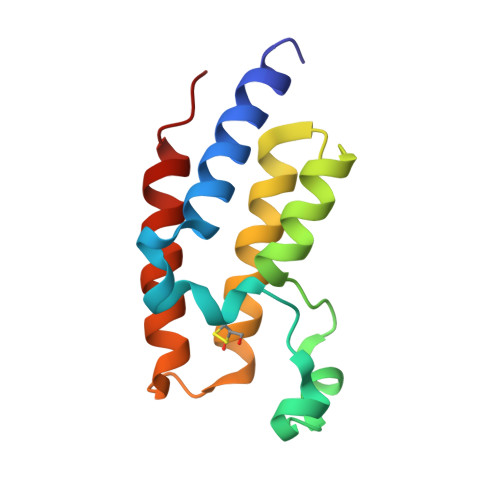Insights into the crystal structure of BRD2-BD2 - phenanthridinone complex and theoretical studies on phenanthridinone analogs.
Mathur, S., Deshmukh, P., Tripathi, S., Marimuthu, P., Padmanabhan, B.(2018) J Biomol Struct Dyn 36: 2342-2360
- PubMed: 28696179
- DOI: https://doi.org/10.1080/07391102.2017.1353441
- Primary Citation of Related Structures:
5XHE, 5XHK - PubMed Abstract:
Bromodomain and extra-terminal family proteins recognize the acetylated histone code on chromatin and participate in downstream processes like DNA replication, modification, and repair. As part of epigenetic approaches, BRD2 and BRD4 were identified as putative targets, for the management of chronic diseases. We have recently reported the discovery of a new scaffold of the phenanthridinone-based inhibitor (L10) of the second bromodomain of BRD2 (BRD2-BD2). Here, we present the crystal structure of the BRD2-BD2, refined to 1.4 Å resolution, in complex with β-mercaptoethanol (a component of the protein buffer). The β-mercaptoethanol covalently links to C425 of BD2 in the acetyl-lysine binding pocket, to form a modified cysteine mercaptoethanol (CME). The CME modification significantly hinders the entry of ligands into the BD2 binding pocket, suggesting that β-mercaptoethanol should be removed during protein production process. Next, to confirm whether phenanthridionone scaffold is a new inhibitor family of BRD2-BD2, we have determined the crystal structure of BD2 in complex with 6(5H)-Phenanthridinone (a core moiety of L10), refined to 1.28 Å resolution. It confirmed that the phenanthridinone molecule, unambiguously, binds to BD2. Moreover, we performed molecular docking and molecular dynamic studies on selected phenanthridinone analogs. The predicted L10 analogs are stable with essential hydrophobic and hydrophilic interactions with BD2 during molecular dynamic simulations. We propose that the predicted phenanthridinone analogs may be potential molecules for inhibiting the BD2 function of acetylated histone recognition.
Organizational Affiliation:
a Department of Biophysics , National Institute of Mental Health and Neurosciences (NIMHANS) , Hosur Road, Bangalore 560029 , India.

















